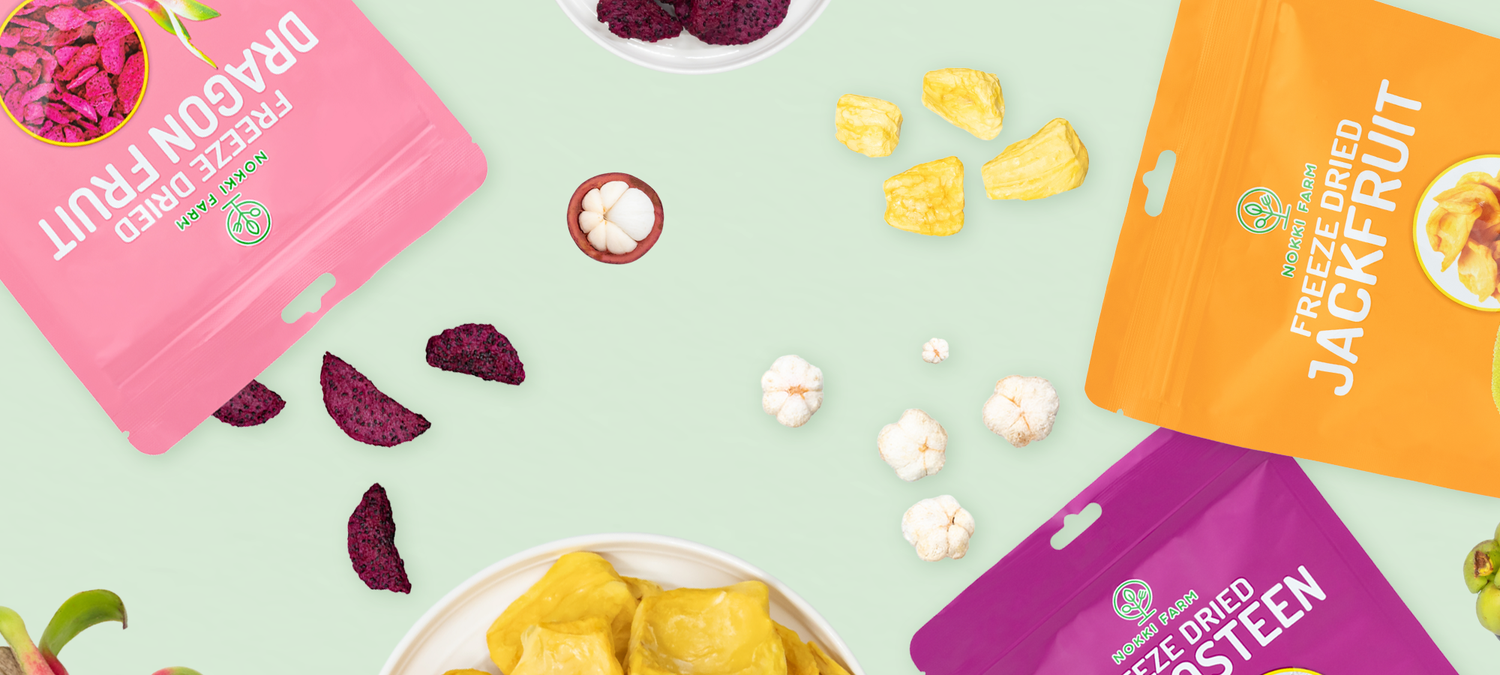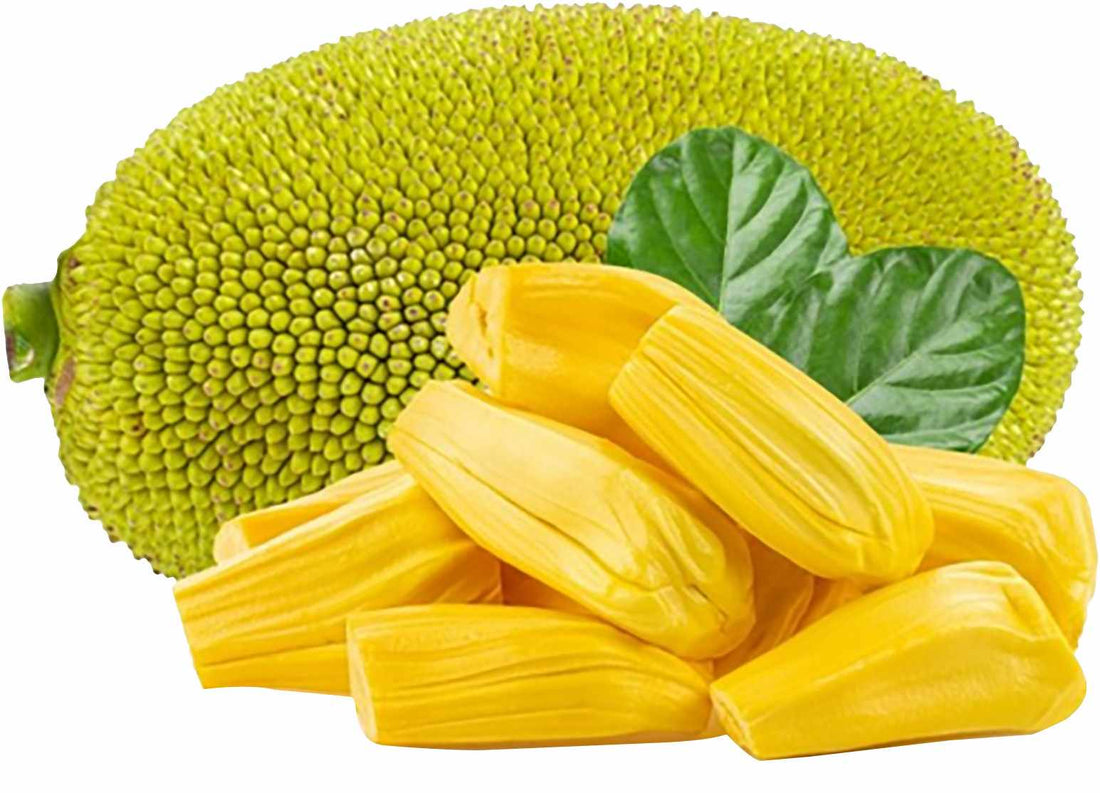The History and Culture of Jackfruit: From Asia to Your Pantry Explore the cultural significance of jackfruit and its journey from traditional uses to modern freeze-drying.
For thousands of years, jackfruit has been a staple in Asian communities, celebrated for its versatility, unique taste, and nutritional value. Today, this tropical marvel is making waves in kitchens around the world. With innovations like freeze-drying, jackfruit has found its way into modern pantries in a whole new form, such as the Nokki Farm Freeze-dried Jackfruit products, bridging the gap between ancient tradition and contemporary convenience.
A Fruit with Ancient Roots
The story of jackfruit begins in the lush rainforests of South and Southeast Asia. Native to countries like India, Bangladesh, Sri Lanka, Thailand, and Malaysia, the jackfruit (Artocarpus heterophyllus) is believed to have been cultivated for over 5,000 years. The fruit thrives in tropical climates, growing on large, hardy trees that can reach heights of up to 80 feet, producing what is now known as the largest tree-borne fruit in the world. A single jackfruit can weigh as much as 100 pounds!
Historically, jackfruit played an important role in the diet and agriculture of these regions. In India, the fruit is often called the "poor man's food" due to its affordability and availability, but it was equally revered for its ability to feed large families. In Kerala, South India, jackfruit even became an official state fruit due to its cultural importance and wide consumption.
Cultural Significance: More Than Just Food
Jackfruit has been more than just sustenance; it holds deep cultural significance across various Asian communities.
Religious and Ceremonial Uses
In many parts of South Asia, jackfruit holds a sacred place in religious ceremonies. The leaves and wood of the jackfruit tree are often used in Hindu rituals. In Sri Lanka and Southern India, jackfruit wood is used to carve statues of deities. Some communities also offer jackfruit as part of their temple offerings, as the fruit is considered a gift from the gods due to its size and abundance.
A Symbol of Abundance and Prosperity
Across Southeast Asia, jackfruit symbolizes abundance. Its large size and ability to feed many people with just one fruit make it a symbol of prosperity and shared wealth. In rural areas of Thailand and Cambodia, jackfruit trees are often planted near homes as a talisman of good fortune.
Traditional Medicine
Jackfruit also finds its place in traditional medicine. The leaves, seeds, and roots have been used for centuries in Ayurvedic and traditional Asian medicine. It is believed to help treat ailments ranging from skin disorders to digestive problems. The fruit is rich in vitamins and antioxidants, which aid in boosting the immune system, improving skin health, and regulating blood sugar levels.
Traditional Culinary Uses
Jackfruit’s versatility is legendary in Asian cuisine, where it is used in both sweet and savory dishes.
Green Jackfruit (Unripe)
In its unripe form, jackfruit is often used as a vegetable in curries, stews, and stir-fries. Its mild, fibrous texture can mimic meat, making it a favorite among vegetarians and vegans. In India, young jackfruit curry (known as “Kathal Ki Sabzi”) is a beloved dish, while in Indonesia, “Gudeg,” a sweet jackfruit stew, is a regional specialty. The unripe jackfruit's ability to absorb the flavors of spices and seasonings makes it a culinary chameleon.
Ripe Jackfruit (Sweet)
When fully ripened, jackfruit transforms into a sweet, aromatic delight. The golden pods within the fruit are eaten fresh, added to desserts, or blended into smoothies. In Thailand, ripe jackfruit is often served with sticky rice, while in the Philippines, it is used to make sweet preserves called "langka." Its tropical flavor, a blend of banana, pineapple, and mango, is beloved across many Asian cultures.
Jackfruit's Journey to the West
Although jackfruit has been consumed in Asia for millennia, it has only recently gained global attention. The rise of plant-based diets and the growing interest in meat alternatives have propelled jackfruit into the spotlight. Its meat-like texture when unripe makes it an excellent substitute for pulled pork, tacos, and burgers, which has led to its popularity in vegan and vegetarian circles.
In the early 2000s, jackfruit started appearing in specialty stores in the West, first as canned or frozen, and eventually in more diverse forms like chips and snack bars. The fruit’s newfound fame has expanded beyond its traditional culinary uses, finding its way into health foods and superfood categories.
Modern Preservation: The Freeze-Drying Revolution
One of the most significant innovations that has brought jackfruit to a global audience is the freeze-drying process. Freeze-drying preserves the natural flavor, texture, and nutrients of the fruit while extending its shelf life. This modern preservation technique allows jackfruit to be enjoyed year-round without the need for refrigeration or artificial preservatives.
The Benefits of Freeze-Drying
Unlike traditional drying methods, freeze-drying retains almost 98% of the fruit’s nutrients. The low-temperature process freezes the moisture in the fruit, which is then removed by sublimation, turning ice directly into vapor without passing through a liquid phase. This results in a light, crispy texture that captures the essence of fresh jackfruit in a convenient form.
Nokki Farm has embraced this technique, offering Freeze-dried Jackfruit snacks that not only preserve the tropical flavors but also the nutritional benefits of the fruit. Packed with dietary fiber, vitamins, and antioxidants, these snacks are a modern twist on an ancient food. They offer a crunchy, wholesome way to enjoy jackfruit on the go—whether you're adding it to your breakfast bowl, using it as a topping for yogurt, or enjoying it straight from the bag.
Jackfruit in Today’s World: A Sustainable Superfood
In addition to its cultural and culinary importance, jackfruit is gaining recognition as a sustainable crop. The fruit is naturally resistant to pests and diseases, requiring minimal intervention from farmers. This makes it an environmentally friendly option compared to other staple crops that rely on heavy pesticide use.
Jackfruit’s ability to feed large populations, combined with its drought-resistant nature, makes it a potential solution to global food security issues. With climate change threatening traditional agricultural practices, jackfruit's resilience and nutritional density position it as a key player in the future of food.
Bringing Jackfruit to Your Pantry with Nokki Farm
From the rainforests of Asia to the aisles of your local grocery store, jackfruit has traveled a long way, adapting to the needs of modern consumers. With Nokki Farm’s Freeze-dried Jackfruit, this ancient fruit is now more accessible than ever. Each bite captures the rich history, culture, and flavor of jackfruit, while offering a healthy, sustainable snack for today’s busy lifestyles.
Whether you’re looking to try jackfruit for the first time or you’re already a fan of its unique taste, the freeze-dried form offers convenience without compromising on nutrition. As the world continues to explore new ways of enjoying traditional foods, jackfruit remains at the forefront of innovation, proving that even ancient fruits can find a place in our modern pantries.
Conclusion
Jackfruit’s rich history, cultural significance, and nutritional value have made it a beloved fruit for centuries. From its ceremonial uses in Asia to its role in traditional medicine and cuisine, jackfruit has always been more than just a fruit. Today, with modern preservation methods like freeze-drying, jackfruit is poised to reach even more people worldwide.
With products like Nokki Farm’s Freeze-dried Jackfruit, you can now enjoy the flavors and benefits of this tropical fruit in a convenient, shelf-stable format. It’s a snack that not only connects you to a long history of cultural traditions but also provides a nutritious and sustainable option for today’s health-conscious consumer.


